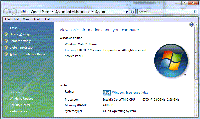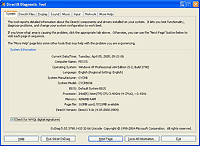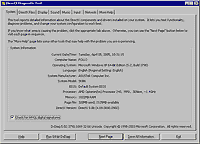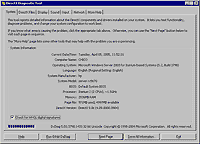(转)How can I determine if my computer/operating system is 64-bit?
2008-10-08 10:30
579 查看
WindowsIf you are using Windows Vista, click Start -> Control Panel -> System and Maintenance -> System. The System type: line will give you the Operating System type: If you are using Windows XP, click Start -> Run and type dxdiag. If a Windows dialog box is displayed asking if you want to verify your drivers, you can safely click No and continue. When the program has finished loading, you should see something similar to one of the following images:
MacintoshYou must be running Mac OS X 10.5 (Leopard) or newer and have a Core 2 Duo or G5 processor for 64-bit support.* To determine if your computer meets both requirements, select About This Mac from the Apple menu. A window will appear from which you can determine the version of Mac OS X and the processor type installed on your computer.* A 64-bit version of Stata 10 for the Macintosh is expected to be available during the second half of 2008. An announcement will be made once it is available. Unix (IBM-AIX, Sun Solaris)IBM-AIXThe getconf command will return the configuration of your machine. Since you are looking only for the kernel parameters, you should type [cph@anna ~]$ getconf -a | grep KERN KERNEL_BITMODE: 64 If that fails or does not return a result, try the file command. [cph@anna ~]$ file /usr/lib/boot/unix* /usr/lib/boot/unix: 64-bit XCOFF executable or object module not stripped /usr/lib/boot/unix_64: 64-bit XCOFF executable or object module not stripped /usr/lib/boot/unix_mp: executable (RISC System/6000) or object module not stripped /usr/lib/boot/unix_up: executable (RISC System/6000) or object module not stripped [cph@ozona ~]$ file /usr/lib/boot/unix* /usr/lib/boot/unix: symbolic link to /usr/lib/boot/unix_up. /usr/lib/boot/unix_kdb: executable (RISC System/6000) or object module not stripped /usr/lib/boot/unix_up: executable (RISC System/6000) or object module not stripped We can see that 'anna' is a 64-bit capable platform, and 'ozona' is only 32-bit. Sun Solaris Sun's platforms transitioned to 64-bit over a period of time, making identifying the platform for 64-bit compliance tricky. Sun has stated: Sun has implemented its 64-bit operating system in phases. The Solaris 2.5 Operating Environment provided support for increased precision with 64-bit math and also included support for 64-bit asynchronous I/O. The Solaris 2.6 Operating Environment added support for large datasets with large (1 Terabyte) filesystems while allowing co-existence of 32-bit and 64-bit files. Beginning with the Solaris 7 Operating Environment, Sun introduced support for large virtual address spaces with a full 64-bit operating system. Sun began shipping 64-bit hardware in 1995. By phasing in operating system support for 64-bits Sun has provided 64-bit features as the market has demanded them while guaranteeing compatibility for existing 32-bit applications. To determine what kind of binaries your Solaris machine can run, try the following: eden:/home/cph: isainfo -v 64-bit sparcv9 applications 32-bit sparc applications You can see that this Solaris machine is capable of running 32-bit as well as 64-bit applications. If isainfo fails, running a 64-bit application on your Sun will generally not be possible, unless of course isainfo is not in your path or has not been installed. You can also use the uname command to glean more information: eden:/home/cph: uname -a SunOS eden 5.8 Generic_108528-05 sun4u sparc SUNW,Ultra-5_10 lagrange:/usr/users/cph: uname -a SunOS lagrange 5.5.1 Generic_103640-29 sun4u sparc SUNW,Ultra-1 SunOS/Solaris versions map to the following:
LinuxLinux users should type the uname command. Depending on the platform, you may see[cph@gaylord ~]$ uname -a Linux gaylord.stata.com 2.6.11-1.27_FC3 #1 Tue May 17 20:24:57 EDT 2005 x86_64 x86_64 x86_64 GNU/Linux [cph@caddo ~]$ uname -a Linux caddo.stata.com 2.6.9-5.0.5.EL #1 SMP Fri Apr 8 14:20:58 EDT 2005 ia64 ia64 ia64 GNU/Linux [cph@tango ~]$ uname -a Linux tango.stata.com 2.6.10-1.771_FC2smp #1 SMP Mon Mar 28 01:10:51 EST 2005 i686 i686 i386 GNU/Linux In the above listing, 'gaylord' (x86_64 GNU/Linux) and 'caddo' (ia64 GNU/Linux) are 64-bit compliant. 'tango' (i386 GNU/Linux) is only a 32-bit platform. |
相关文章推荐
- How to determine whether a file is 32 bit or 64 bit
- How do I know if my Mac Pro is 32 or 64 bit system?
- How to justify if a windows program is 32 bit or 64 bit
- How to Check if Linux (Ubuntu, Fedora Redhat, CentOS) is 32-bit or 64-bit
- How Can I Detect if a Running System is a Virtual Guest?
- 在64位系统下安装32位ODBC驱动问题How to install and configure a 32 bit ODBC driver on a 64 bit Operating System?
- How to check if a static library is built for 64-bit?
- How you can Determine if Prada Clothes are Real
- How to Make a Computer Operating System -- Chapter1, 2
- check if unmanaged dll is 32-bit or 64-bit?
- 【iOS】The run destination My Mac 64-bit is not valid for Running the scheme '*'
- Version of IE 32 bit or 64 bit? - How can I tell which version I am using?
- The run destination My Mac 64-bit is not valid for Running the scheme
- The run destination My Mac 64-bit is not valid for Running the scheme '*****'.
- The run destination My Mac 64-bit is not valid for Running the scheme '*'.
- How can I disable the User Account Control (UAC) feature on my Windows Vista computer?
- How to tell if you’re running the 32 bit or 64 bit kernel in Mac OS X Snow Leopard
- How can I add a user to a group under Linux operating system?
- The run destination My Mac 64-bit is not valid for Running the scheme 'MultiTouchDemo'
- How can you determine how much disk space a particular MySQL table is taking up?



